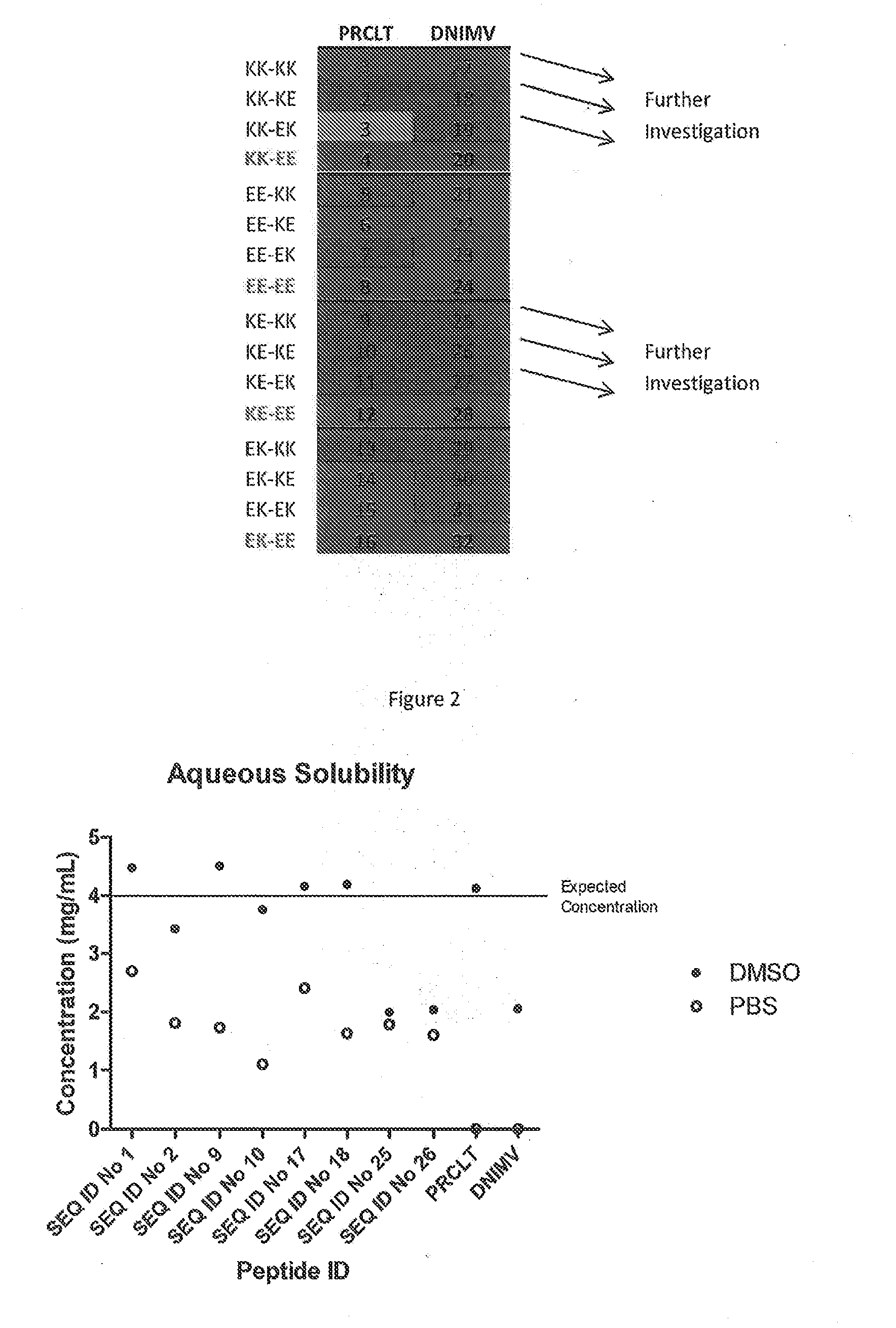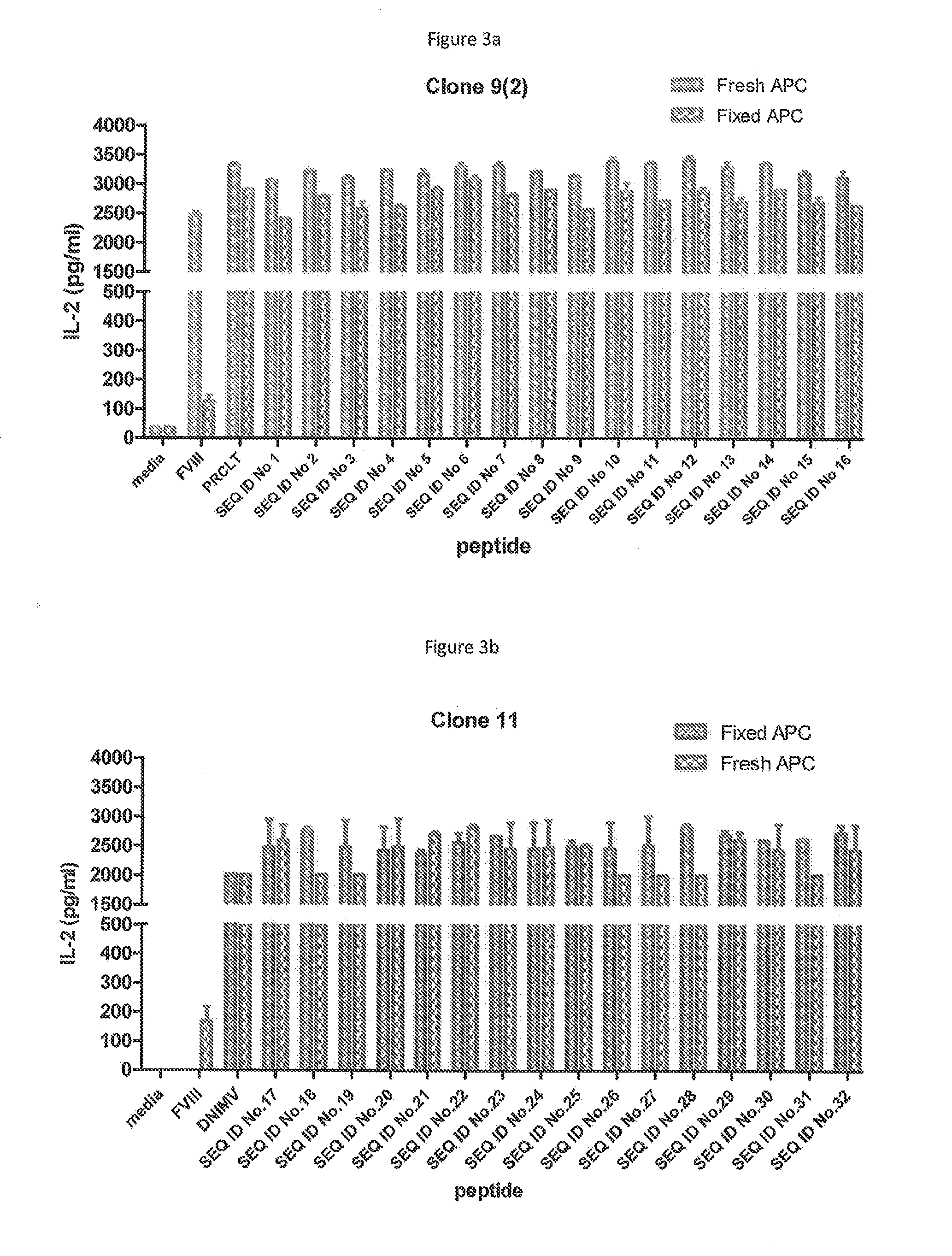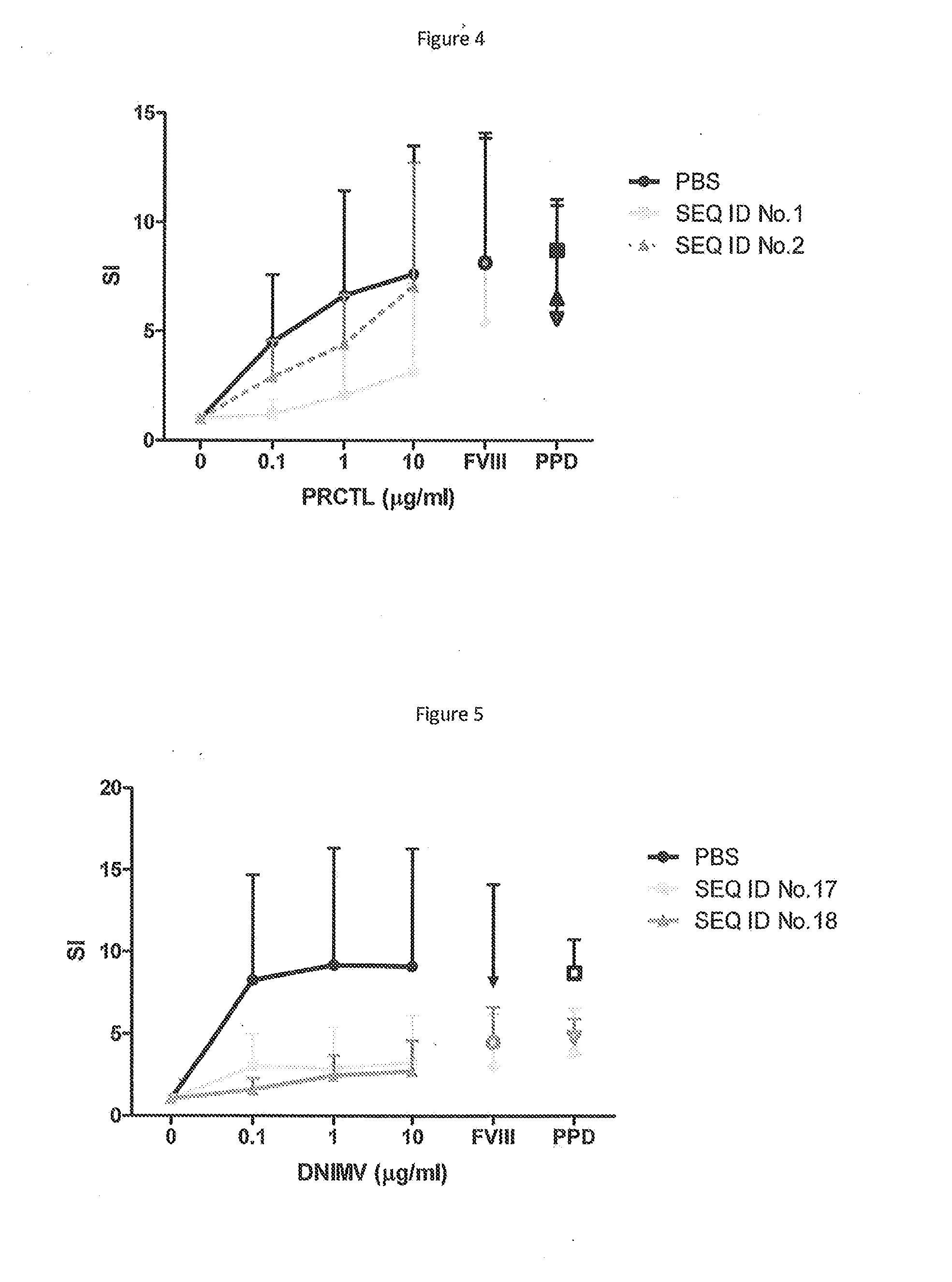Modified fviii apitope peptides
a technology of apitopes and peptides, applied in the field of peptides, can solve the problems of increased bleeding time, internal bleeding into joints, muscles and soft tissues, difficult to manage, etc., and achieve the effects of suppressing, reducing or preventing the development of factor viii inhibitor antibodies
- Summary
- Abstract
- Description
- Claims
- Application Information
AI Technical Summary
Benefits of technology
Problems solved by technology
Method used
Image
Examples
example 1
Investigating the Solubility of FVIII-Derived Peptides
[0162]A total of 32 peptides were tested: 16 of which were based on the FVIII peptide PRCLTRYYSSFVNME (“PRCLT”); and 16 of which were based on the FVIII peptide DNIMVTFRNQASRPY (“DNIMV”). The peptides are summarised in Tables 1 and 2 below.
TABLE 1PRCLT-derived peptidesPeptideSEQ IDNoSequenceNo. 1Lys-Lys-Gly-Pro-Arg-Cys-Leu-Thr-Arg- 1Tyr-Tyr-Ser-Ser-Phe-Val-Asn-Met-Glu-Gly-Lys-Lys 2Lys-Lys-Gly-Pro-Arg-Cys-Leu-Thr-Arg- 2Tyr-Tyr-Ser-Ser-Phe-Val-Asn-Met-Glu-Gly-Lys-Glu 3Lys-Lys-Gly-Pro-Arg-Cys-Leu-Thr-Arg- 3Tyr-Tyr-Ser-Ser-Phe-Val-Asn-Met-Glu-Gly-Glu-Lys 4Lys-Lys-Gly-Pro-Arg-Cys-Leu-Thr-Arg- 4Tyr-Tyr-Ser-Ser-Phe-Val-Asn-Met-Glu-Gly-Glu-Glu 5Glu-Glu-Gly-Pro-Arg-Cys-Leu-Thr-Arg- 5Tyr-Tyr-Ser-Ser-Phe-Val-Asn-Met-Glu-Gly-Lys-Lys 6Glu-Glu-Gly-Pro-Arg-Cys-Leu-Thr-Arg- 6Tyr-Tyr-Ser-Ser-Phe-Val-Asn-Met-Glu-Gly-Lys-Glu 7Glu-Glu-Gly-Pro-Arg-Cys-Leu-Thr-Arg- 7Tyr-Tyr-Ser-Ser-Phe-Val-Asn-Met-Glu-Gly-Glu-Lys 8Glu-Glu-Gly-Pro-Arg-Cys-Leu-Thr-Arg- ...
example 2
Direct Dissolution of Tagged Peptides in Aqueous Solvent at Clinically Relevant Concentration
[0168]For each test peptide and the parent peptides (PRCLT and DNIMV) two tubes were prepared at 4 mg / mL in either DMSO (control) or PBS.
[0169]Each tube was spun at full speed in a mini-centrifuge for 5 minutes. A 10 μL sample was removed from the top of each solution and the molecular weight and coefficient of absorption was recorded for each peptide.
[0170]The absorbance of the supernatant was measured using NanoDrop and the concentration calculated. The actual concentration was compared to the expected value of 4 mg / mL and the results are shown in FIG. 2. In this Figure, greater disparity between the actual and expected concentration corresponds to lower relative solubility.
[0171]As shown in FIG. 2, the tagged peptides SEQ ID No. 1, 2, 9, 10, 17, 18, 25 and 26 all had improved solubility in PBS compared to the parent peptides.
example 3
The Tagged Peptides Act as Apitopes
[0172]HLA-DR2 transgenic mice were primed with the parent peptides PRCLT or DNIMV. Spleen and lymph nodes were then harvested, and after CD4 purification, cells were restimulated with 1 ug / ml human recombinant FVIII. After fusion with BW5147 cells, the resulting clones were expanded and ‘screened’ for specificity to DNIMV or PRCLT. This is performed by incubating hybridoma cells with 5×104 DR2-positive antigen presenting cells (MGAR cell line) and 10 ug / ml PRCLT / DNIMV or media for 48 hours. The supernatants were then analysed for IL-2 production by ELISA.
[0173]Clones which produced IL-2 specifically when incubated with peptide were expanded and screened again with FVIII (at 1 ug / ml).
[0174]Clones which produced IL-2 in response to both FVIII and peptide were then used to assess whether the modified DNIMV and PRCLT peptides are apitopes i.e. whether they are capable of binding to an MHC molecule and being presented to a T cell by both fixed and fresh...
PUM
| Property | Measurement | Unit |
|---|---|---|
| concentration | aaaaa | aaaaa |
| concentrations | aaaaa | aaaaa |
| concentrations | aaaaa | aaaaa |
Abstract
Description
Claims
Application Information
 Login to View More
Login to View More - R&D
- Intellectual Property
- Life Sciences
- Materials
- Tech Scout
- Unparalleled Data Quality
- Higher Quality Content
- 60% Fewer Hallucinations
Browse by: Latest US Patents, China's latest patents, Technical Efficacy Thesaurus, Application Domain, Technology Topic, Popular Technical Reports.
© 2025 PatSnap. All rights reserved.Legal|Privacy policy|Modern Slavery Act Transparency Statement|Sitemap|About US| Contact US: help@patsnap.com



